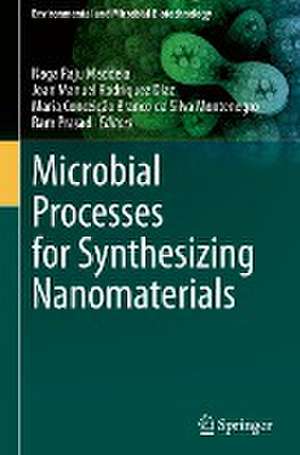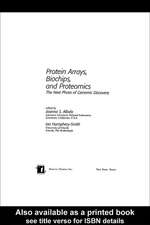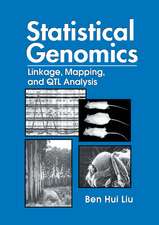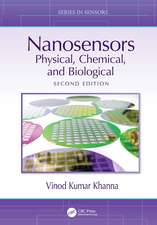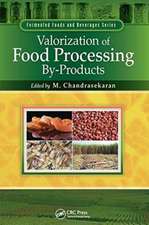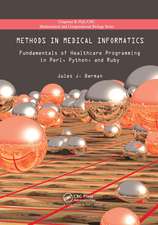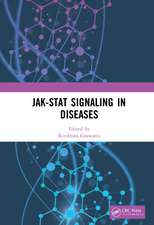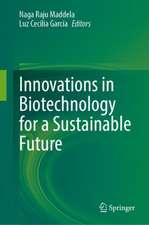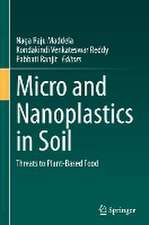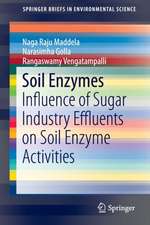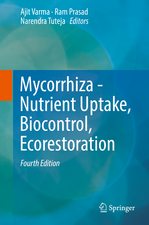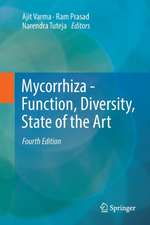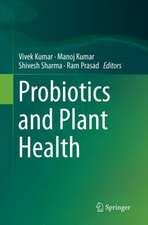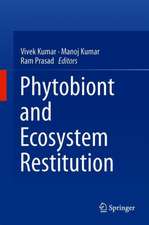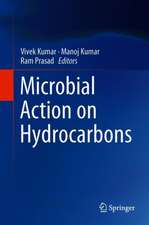Microbial Processes for Synthesizing Nanomaterials: Environmental and Microbial Biotechnology
Editat de Naga Raju Maddela, Joan Manuel Rodríguez Díaz, Maria Conceição Branco da Silva Montenegro, Ram Prasaden Limba Engleză Hardback – 5 sep 2023
Din seria Environmental and Microbial Biotechnology
- 18%
 Preț: 1562.17 lei
Preț: 1562.17 lei - 18%
 Preț: 1390.89 lei
Preț: 1390.89 lei - 24%
 Preț: 940.16 lei
Preț: 940.16 lei - 24%
 Preț: 1192.28 lei
Preț: 1192.28 lei - 18%
 Preț: 947.35 lei
Preț: 947.35 lei - 18%
 Preț: 1384.44 lei
Preț: 1384.44 lei - 18%
 Preț: 1116.57 lei
Preț: 1116.57 lei - 24%
 Preț: 901.65 lei
Preț: 901.65 lei - 18%
 Preț: 1218.06 lei
Preț: 1218.06 lei - 18%
 Preț: 1128.70 lei
Preț: 1128.70 lei - 18%
 Preț: 951.47 lei
Preț: 951.47 lei - 18%
 Preț: 1661.58 lei
Preț: 1661.58 lei - 18%
 Preț: 1564.85 lei
Preț: 1564.85 lei - 18%
 Preț: 1388.22 lei
Preț: 1388.22 lei - 18%
 Preț: 944.36 lei
Preț: 944.36 lei
Preț: 1231.47 lei
Preț vechi: 1501.79 lei
-18% Nou
Puncte Express: 1847
Preț estimativ în valută:
235.66€ • 244.65$ • 196.51£
235.66€ • 244.65$ • 196.51£
Carte disponibilă
Livrare economică 01-15 martie
Preluare comenzi: 021 569.72.76
Specificații
ISBN-13: 9789819928071
ISBN-10: 9819928079
Pagini: 394
Ilustrații: XXII, 394 p. 1 illus.
Dimensiuni: 155 x 235 mm
Greutate: 0.84 kg
Ediția:1st ed. 2023
Editura: Springer Nature Singapore
Colecția Springer
Seria Environmental and Microbial Biotechnology
Locul publicării:Singapore, Singapore
ISBN-10: 9819928079
Pagini: 394
Ilustrații: XXII, 394 p. 1 illus.
Dimensiuni: 155 x 235 mm
Greutate: 0.84 kg
Ediția:1st ed. 2023
Editura: Springer Nature Singapore
Colecția Springer
Seria Environmental and Microbial Biotechnology
Locul publicării:Singapore, Singapore
Cuprins
Chapter 1 - Microbial Nanomaterial Synthesis: Types and Applications.- Chapter 2 - Microbial Synthesis of Gold Nanoparticles.- Chapter 3 - Microbial synthesis of gold nanoparticles.- Chapter 4 - Fungal-based Nanoparticles.- Chapter 5 Synthesis of Fungal-based Nanoparticles.- Chapter 6 - Synthesis of Nanoparticles in Biofilms.- Chapter 7 - Microbial Enzymes in Nanoparticle Synthesis.- Chapter 8 - Synthesis And Studies Of TTAHOT – Macro, Micro and Nano Crystalline Composite for Electronic and Bio-Medicinal Use.- Chapter 9 - Growth and Characterizations of Red Bromide – The Pleochroism Based Crystals for Bio-Medicinal, Electronic and Mechano Uses.- Chapter 10 - Nano Diagnostics for Rapid and Accurate Detection of Infectious Diseases.- Chapter 11 - Smart-drug Nanoparticles from Microorganisms and Drug Delivery.- Chapter 12 - Bactericidal Effects- Microbial Nanoparticles as Next Generation Antimicrobials.- Chapter 13 - Microbiologically Synthesized Nanoparticles and their Role in Biofilm Inhibition.- Chapter 14 - Microbially Synthesized Nanoparticles in Sustainable Agriculture.- Chapter 15. Applications of Microbially Synthesized Nanoparticles to Food Science.- Chapter 16 - Biotechnological implications of extracellular vesicles.
Notă biografică
Naga Raju Maddela received his MSc (1996–1998) and PhD (2012) in Microbiology from Sri Krishnadevaraya University, Anantapuramu, India. During his doctoral program in the area of Environmental Microbiology, he investigated the effects of industrial effluents/insecticides on soil microorganisms and their biological activities, and he has been working as a Faculty in Microbiology since 1998, teaching undergraduate and postgraduate students. He received “Prometeo Investigator Fellowship” (2013–2015) from Secretaría de Educación Superior, Ciencia, Tecnología e Innovación (SENESCYT), Ecuador, and “Postdoctoral Fellowship” (2016–2018) from Sun Yat-sen University, China. He also received external funding from “China Postdoctoral Science Foundation” in 2017. He is working in the area of environmental biotechnology, participated in 30 national/international conferences, and presented research data in China, Cuba, Ecuador, India, and Singapore. Currently, he is working as a full-time professor at the Facultad de Ciencias de la Salud, Universidad Técnica de Manabí, Portoviejo, Ecuador. He has published 10 books, 45 chapters, and 60 research papers.
Joan Manuel Rodríguez Díaz received his bachelor’s degree in chemical sciences (2003), MSc in Process Analysis in the Chemical Industry (2007) from Universidad Central de Las Villas, PhD in Chemistry in Analytical Chemistry (2013), and two postdoctoral degrees at the Federal University of Pernambuco (2014–2015). Currently, he is working as a Principal Professor II, Principal Investigator III, Coordinator of the master’s degree in chemical engineering, and Coordinator of the Laboratory of Chemical and Biotechnological Analysis at the Universidad Técnica de Manabí (Ecuador). Since 2019, he is working as a visiting professor of the postgraduate program in Chemical Engineering at the Universidade Federal da Paraíba (Brazil). He is a director of several research projects and collaborator in other projects with universities in Brazil, Portugal, and Cuba. He has guided 8 PhD and 18 MSc students and tutored in post-graduate programs at Instituto Politécnico de Leiria (Portugal), Universidad Técnica de Manabí (Ecuador), Universidade Federal de Pernambuco, and Universidade Federal da Paraíba (Brazil). He has published 8 book chapters (Springer) and more than 45 research papers. He is the reviewer for several journals, including Research on Chemical Intermediates, Journal of Environmental Chemical Engineering, Brazilian Journal of Pharmaceutical Sciences, and Journal of Cleaner Production. He has expertise in Environmental Chemistry, in areas of bioadsorption, filtration processes, heterogeneous catalysis, nanomaterials, new biadsorbent materials, and advanced oxidation processes (AOP).
Maria Conceição Branco da Silva Montenegro (1957) is a full professor at the Laboratory of Applied Chemistry, Department of Chemical Sciences, Faculty of Pharmacy atthe University of Porto (FFUP), Portugal, in the fields of Analytical Chemistry and Applied Chemistry. She graduated with her bachelor’s degree (1980) and PhD (1991) in Pharmacy with specialization in Pharmaceutical Chemistry from the University of Porto. She is a senior researcher at LAQV/REQUIMTE, a Portuguese Research Centre for Sustainable Chemistry, where she leads a unit of sensors and biosensors. Her main research activities are related to the development of sensor platforms with potentiometric and electrochemical transduction for food, pharmaceutical, clinical, and environmental control. She also extended her area of expertise looking for new polymeric membrane approaches for retention and separation, applied to clinical, bioanalytical, and environmental concerns and new degradation methods for environmental remediation. She has published over 200 articles, 7 book chapters, and 3 patents; supervised more than 20 PhD students; and led more than 15 scientific projects. She maintains several research collaborations with foreign universities, namely Charles University (Czech Republic), Technical University of Manabí (Ecuador), Federal University of Pernambuco (Brazil), and Instituto de Química, Universidade de Campinas (Brazil) collaborating in research projects and in the supervision of students.
Ram Prasad, PhD, is associated with Department of Botany, Mahatma Gandhi Central University, Motihari, Bihar, India. His research interest includes applied and environmental microbiology, plant-microbe interactions, sustainable agriculture, and nanobiotechnology. Dr. Prasad has more than two hundred publications to his credit, including research papers, review articles and book chapters, and six patents issued or pending, and edited or authored several books. He has twelve years of teaching experience and has been awarded the Young Scientist Award and Prof. J.S. Datta Munshi Gold Medal by the International Society for Ecological Communications; FSAB fellowship by the Society for Applied Biotechnology; the American Cancer Society UICC International Fellowship for Beginning Investigators, USA; Outstanding Scientist Award in the field of Microbiology; BRICPL Science Investigator Award and Research Excellence Award. He has been serving as editorial board members of BMC Microbiology, BMC Biotechnology, Current Microbiology, Archives of Microbiology, Annals of Microbiology, IET Nanobiotechnology, Journal of Renewable Material, Archives of Phytopathology and Plant Protection, Journal of Agriculture and Food Research, and Environmental Science and Ecotechnology including Series editor of Nanotechnology in the Life Sciences, Springer Nature, USA. He also served as Assistant Professor, Amity University, Uttar Pradesh, India; Visiting Assistant Professor, Whiting School of Engineering, Department of Mechanical Engineering at Johns Hopkins University, Baltimore, United States; and Research Associate Professor at School of Environmental Science and Engineering, Sun Yat-sen University, Guangzhou, China.
Textul de pe ultima copertă
This contributed volume compiles the latest improvements in the field of nanobiotechnology, with a special emphasis on microbial-synthesized nanoparticles. It focuses on topics that comprise the microbials synthesized nanoparticles, their characterization, and applications in the field of medicine and biotechnology, which are organized in three parts, respectively. Ranging from micro-scale studies to macro, it covers a huge domain of nanotechnology in relevance to microbiology. Overall, the book portrays the importance of microbial processes in the sustainable production of nanomaterials to reduce the environmental burden caused by nanomaterials produced by chemical processes. The book is a ready reference for practicing students, researchers of nanobiotechnology, environmental biotechnology, and other allied fields likewise.
Caracteristici
Covers key issues in the microbial synthesis of nanomaterials Provides comprehensive information on the characteristics and role of nanomaterials Each chapter contains recent literature on microbe generated nanomaterials
